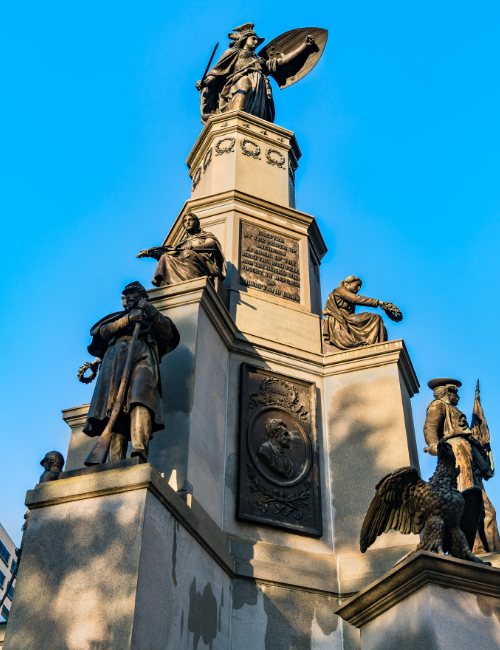
Understanding Homeowners Association (HOA) Dues: A Complete Guide
In Detroit’s booming real estate sector, Homeowners Association (HOA) dues are integral in supporting shared amenities and maintaining community standards for residential developments. Understanding why these dues exist, which is to manage shared expenses like landscaping, maintenance, security, and upkeep of common areas, makes understanding them easier.
Also, homeowners’ association fees in Detroit differ from region to region and change significantly based on the services offered. These fees are mostly set monthly or yearly and are crucial in maintaining a visually and functionally appealing community space and sustaining property value.
However, overdue HOA dues can greatly complicate associations, affecting their budget management. Homeowners must know that late payments may attract penalties, accruable interest, and legal action.
For associations in Detroit, clear policies and communication strategies are vital for efficiently managing delinquent accounts while maintaining positive relationships with homeowners. Understanding the structure and importance of HOA dues empowers homeowners and associations to work together toward a harmonious community environment.
Common Reasons for Delinquent HOA Dues Among Residents
In Detroit’s real estate market, residents’ delinquent HOA dues are often caused by financially challenging situations such as loss of employment or surprise medical expenditures. Such situations stretch a homeowner’s budget thin and complicate payment prioritization. Some residents may also lack awareness of payment processes and deadlines, leading to payment misses.
Shrinking property values during economic downturns also tend to occur with significantly lower demand for houses and apartments in Detroit. Moreover, the ongoing disagreements with board members about community management or the quality of service provided can lead to apathy towards meetings. This is due to some homeowners reevaluating the value of HOA dues and any further disputes from that point.
These create financial oversights and, later, delinquencies. New members often miscalculate household expenditures in areas where a homeowners association is active, leading to budgetary blunders. Understanding these core issues greatly assists in devising effective strategies to minimize account delinquency in residential areas.
Blue Moon Acquisitions works with homeowners associations in Detroit to address delinquencies by developing proactive financial strategies, improving communication, and offering practical solutions that strengthen community engagement and reduce disputes.
Legal Consequences of Not Paying HOA Fees in Michigan
In Michigan, failure to pay homeowner’s association (HOA) fees has some legal ramifications, especially for Detroit residents. Ignoring overdue HOA payments could result in liens being placed on the property, which would severely lower the homeowner’s credit score and make selling or refinancing the house a complicated affair.
In extreme situations, associations can start foreclosure processes to reclaim money owed since, under the state’s laws, HOAs can enforce lien rights through foreclosure action for unpaid dues. Additionally, delinquent homeowners might incur late fees, interest charges, and legal expenses that compound their financial obligations.
Property owners in Detroit must understand these potential repercussions and proactively engage with their HOA to negotiate payment plans or seek resolution methods before facing these severe penalties.
Strategies for Collecting Overdue HOA Payments Effectively

In the case of real estate in Detroit, balancing caring concern and decisiveness is essential when dealing with past-due HOA payments. Setting up a policy for collecting overdue payments also helps to clearly outline the penalties for accruing overdue payments, and all homeowners are familiar with the late payment schedule.
Having open lines of communication is very important. Communication done early allows the community manager to tackle underlying issues. Establishing open communication increases the chances of resolving conflicts expeditiously without incurring additional expenses.
Manually tracking payment reminders can create confusion; thus, utilizing autoresponders and digital payment platforms can simplify the tracking process for the community and the homeowners. Moreover, long-term defaulters may necessitate collection agencies that specialize in homeowner associations.
Legal measures must be the last option taken; however, the legal framework is vital for safeguarding the association’s finances and staying within the bounds of HOA law for Detroit.
Managing Financial Challenges with Your HOA Budget
Overdue payments of association dues in Detroit real estate entail systematic financial control. Maintaining the stability of your homeowners’ association requires careful budgeting and proactive planning. One working solution would be to build a solid HOA budget that makes room for shortfalls in unpaid dues and anticipates budget deficits in advance.
Including reserve funds in the budget also enables the HOA to maintain essential services despite the impact of delinquent payments. Having a clearly defined overdue account collection policy, including steady communication and installment payment options for homeowners, is of equal importance, enhancing the collection rate.
Working with a specialized management company that understands the intricacies of Detroit’s housing market can help you overcome specific financial difficulties. Regarding HOA governance, being more open and responsible helps build trust that motivates residents to pay dues and reduces overall delinquency in the long run.
If your HOA is facing challenges with delinquent accounts or budgeting for reserve funds, contact us to explore tailored strategies and professional management support designed for Detroit communities.
Ways to Resolve Disputes Over Hoa Assessments Legally
Managing overdue payments for an HOA in Detroit real estate requires understanding the law concerning HOA dues and assessments. Homeowner communication is essential because, in many cases, simple communication can solve problems without going to court.
Establishing defined procedures for dealing with overdue payments helps prevent strife in the community because homeowners will have documented ways to resolve overdue payments. Mediation provides a neutral setting where both parties can come to terms without the hassle of court litigation, which is beneficial in dispute escalation scenarios.
Where litigation is unavoidable, homeowners’ associations are bound by the collection and lien rules set by the bylaws and the relevant law. Securing a Michigan real estate attorney may improve compliance with these regulations and the association’s claim enforceability. Compliance matters are handled expertly when legal representation is procured.
By enforcing community standards, associations trust their members with the obligations and cultivate trust within the community.
The Impact of Delinquent Dues on Community Services and Maintenance
In Detroit’s real estate environment, delinquent HOA dues considerably influence community services and maintenance. This significantly impacts the communal spaces’ landscaping, security, and maintenance, and homeowners’ associations often face monetary issues as a result.
The lack of investment may cause eroded infrastructure, diminished property values, and a loss of charm in the neighborhood’s appearance over time. Moreover, overdue payments can also hamper an HOA’s ability to maintain essential payment-required improvements, resulting in frequent special assessments or higher fees for the rest.
The financial burden caused by delinquent accounts may also force associations to cut back on amenities or delay critical maintenance projects, affecting the quality of life within the community. In Detroit’s diverse housing market, effectively managing these delinquencies is crucial to maintaining vibrant and sustainable residential environments.
Exploring Payment Plan Options for Overdue HOA Fees

Considering various options related to payment plans can be a useful approach to dealing with overdue HOA dues in Detroit real estate. Homeowners associations (HOAs) usually have to deal with overdue fees, but granting flexible payment plans to the residents does help.
Having set payment structures in place helps homeowners clear their dues in multiple smaller amounts instead of a single large payment, reducing repayment stress. This strategy not only works in recovering outstanding overdue amounts but also helps build goodwill and enhance cooperation between the residents and the HOA board.
Adjusting payment calendars to personal situations, including monthly or quarterly payments, enables greater success in debt recovery while preserving community relations. Also, the methods of granting payment options help promote homeowners’ compliance with community obligations and highlight the advantages of compliance.
This strategy alleviates the need to implement more extreme measures, such as liens and foreclosures, while still assisting Detroit HOAs in preserving vital services. As such, it fosters the upkeep of property values and stability within the community.
How Hoas Can Improve Dues Collection Processes in Detroit
Considering Detroit’s real estate market, homeowners’ associations may streamline some processes for collecting overdue HOA dues. Most importantly, the outlined collection processes could benefit from better communication strategies.
Systematic automation, combined with self-service technology, simplifies collection tasks, eases the burden on clients, and positively impacts transaction volumes. Automated incremental systems for payment collection enhance customer service and overall engagement.
Emails and SMS alerts with proactive reminders are effective for notifying residents about upcoming deadlines. Apart from these reminders, offering flexible payment plans assists financially struggling residents by enabling them to manage their dues without accruing the risk of defaulting.
Engaging with a professional collections agency may benefit persistent cases, as these agencies specialize in recovering overdue fees while adhering to legal guidelines. HOAs can encourage residents to prioritize their dues obligations within the Detroit real estate market by fostering a cooperative community atmosphere and providing educational workshops about financial planning.
Engaging Homeowners to Foster Compliance with Association Rules
For the Detroit real estate sector, motivating homeowners to comply with association regulations is essential for mitigating HOA dues delinquency. Through effective communication, associations can gain insight into homeowners’ financial struggles and assist in finding viable solutions.
Community meetings and workshops teach members about their roles, from discussing payment options to various forms of financial assistance. Direct communication alongside newsletters enhances trust and promotes timely payments.
Offering waiving late fees or providing them with early payment discounts encourages homeowners to fulfill their obligations. Encouragingly cultivating a supportive community where homeowners feel valued bolsters compliance with HOA regulations and reduces delinquent dues across Detroit’s diverse neighborhoods.
Analyzing the Role of Property Management Companies in Fee Collection
Property management companies play a crucial role in collecting delinquent HOA dues within Detroit real estate, offering strategic solutions that enhance financial stability for homeowners’ associations. These companies leverage their expertise in managing community finances and navigating complex legal frameworks to pursue overdue payments efficiently.
By implementing effective communication strategies, property management firms maintain open lines with homeowners, ensuring transparency and fostering cooperative relationships. Additionally, they utilize advanced software systems to track payment histories and identify patterns of delinquency, enabling proactive measures.
Property managers often collaborate with legal professionals to initiate appropriate actions against chronic non-payers while adhering to local regulations. Their involvement alleviates the administrative burden on HOA boards and helps maintain property values by ensuring consistent cash flow for essential community services and amenities.
Through tailored approaches, property management companies ensure that delinquent HOA dues are addressed promptly and effectively in Detroit’s diverse real estate landscape.
Best Practices for Transparent Communication Between Hoas and Members

Effective communication is crucial for managing delinquent HOA dues in Detroit real estate. Homeowners’ associations should prioritize transparency to foster trust and cooperation among members.
Regularly updating residents with clear, concise information about financial obligations, upcoming dues, and non-payment consequences can significantly reduce delinquency rates. Utilizing multiple communication channels, such as emails, newsletters, and community meetings, ensures that all members are informed regardless of their preferred method of receiving updates.
Additionally, offering resources that explain the association’s budgetary needs and how dues contribute to community maintenance can enhance understanding and compliance. Open dialogue during board meetings encourages member participation and provides a platform for addressing concerns or misconceptions about dues policies.
Adopting these best practices for transparent communication allows HOAs in Detroit to create a more harmonious environment where members feel informed and engaged in their community’s financial health.
Tips for Homeowners to Stay Current on Their Association Fees
Staying current on association fees is crucial for homeowners in Detroit’s real estate market to avoid the repercussions of delinquent HOA dues. One effective strategy is setting up automated payments through your bank or directly with the homeowners’ association, ensuring dues are paid on time without the hassle of remembering due dates.
Homeowners should also create a detailed budget that factors in their monthly association fees, prioritizing these payments to prevent financial strain. Keeping an open line of communication with the HOA board can be beneficial; if financial difficulties arise, reaching out early can lead to potential solutions like payment plans or temporary relief options.
Additionally, regularly reviewing the HOA’s financial statements and budget updates allows homeowners to stay informed about any changes in fee structures or upcoming assessments. By actively managing their finances and maintaining transparent communication with their association, homeowners can effectively prevent falling behind on dues and contribute positively to the community’s overall well-being.
How Economic Factors Influence Homeowners’ Ability to Pay Dues
Economic factors significantly influence homeowners’ ability to pay HOA dues, especially in Detroit’s real estate market. The city’s economic landscape, characterized by fluctuating employment rates and varying income levels, directly impacts residents’ financial stability.
When unemployment rises, or wages stagnate, homeowners may struggle to prioritize their expenses, increasing delinquency rates in HOA dues. Additionally, the cost of living and inflation can further strain household budgets, making it challenging for property owners to meet their financial obligations.
Housing market trends also affect homeowners; for instance, declining property values can reduce equity and limit refinancing options, exacerbating financial difficulties. Moreover, unexpected economic downturns or shifts in local industries can leave many households financially vulnerable, increasing the likelihood of missed association fee payments.
These economic pressures underscore the importance of implementing effective strategies for managing delinquent HOA dues within Detroit’s diverse and dynamic real estate environment.
Key Legislative Updates Affecting Hoa Dues Enforcement in Michigan
Recent legislative updates in Michigan have significantly impacted how homeowners associations (HOAs) manage and enforce delinquent dues, particularly in areas like Detroit. One key change involves stricter regulations on the procedures HOAs must follow before taking legal action against homeowners with overdue payments.
These modifications ensure fair treatment and transparency, requiring associations to provide detailed notices and offer ample opportunities for residents to resolve their delinquencies. Additionally, recent laws emphasize alternative dispute resolution methods, encouraging mediation over litigation to settle outstanding dues issues.
This shift aims to reduce legal costs and foster better community relationships. Furthermore, Michigan has introduced more rigorous guidelines for assessing late fees and interest rates on overdue HOA dues, which are designed to prevent excessive financial penalties that disproportionately impact homeowners. In some cases, it may be more practical to sell the house to cash home buyers in Detroit and other cities in Michigan to resolve financial burdens and avoid prolonged disputes quickly.
As a result, HOAs in Detroit must adapt their collection strategies to comply with these updated state laws while effectively managing delinquent accounts.
Case Studies: Successful Resolution of Delinquent HOA Accounts
In Detroit’s real estate market, addressing delinquent HOA dues effectively requires strategic approaches that have proven successful in various case studies. One notable example involves a large condominium association that faced a significant backlog of unpaid dues.
By implementing tailored payment plans and offering temporary financial relief to struggling homeowners, the association recovered a substantial portion of the outstanding funds. Another successful strategy involved collaborating with a professional property management company specializing in debt recovery.
This partnership streamlined the collection process and maintained positive relationships between homeowners and the HOA board. Additionally, clear communication was crucial as regular updates and transparent policies encouraged more residents to settle their accounts promptly.
These case studies highlight how proactive measures, such as early intervention and community engagement, can transform delinquent HOA accounts into resolved matters while fostering trust and cooperation within the community.
What Happens If You Don’t Pay HOA Fees in Michigan?
In Michigan, failing to pay HOA fees can lead to serious consequences that impact Detroit real estate market property owners. When homeowners neglect their Homeowners Association (HOA) dues, the association has legal recourse to pursue debt collection efforts.
Initially, delinquent accounts may incur late fees and interest charges, increasing the overall amount owed. If these dues remain unpaid, the HOA can place a lien on the property, complicating any future sale or refinancing efforts.
In extreme cases, persistent non-payment can result in foreclosure proceedings initiated by the HOA. This process allows the association to recover unpaid dues by selling the property at auction, an option sometimes pursued by a company that buys homes in Sterling Heights and surrounding cities in Michigan.
Therefore, understanding and implementing effective strategies for managing delinquent HOA dues is crucial for maintaining financial stability and avoiding these severe repercussions in Detroit’s competitive real estate landscape.
How to Collect Unpaid HOA Dues?
Collecting unpaid HOA dues in Detroit real estate requires implementing effective strategies tailored to the region’s unique challenges. First, it is essential to maintain clear communication with homeowners about their financial obligations and the consequences of delinquency.
Sending timely reminders and detailed account statements can help prevent missed payments. Establishing a structured payment plan for those experiencing financial hardship can facilitate recovery while maintaining community goodwill.
Legal action, although a last resort, may be necessary; thus, partnering with a local attorney experienced in Detroit real estate law is crucial. Utilizing collection agencies specializing in HOA dues can also be an effective strategy to recover unpaid assessments.
Additionally, fostering a strong sense of community involvement and transparency within the homeowner association can encourage timely payments and reduce future delinquencies. By employing these comprehensive strategies, HOAs can effectively manage delinquent dues, ensuring financial stability and enhancing property values in Detroit neighborhoods.
Do you want to sell your house? Do you want to sell quickly, avoid expensive repairs, or just make an easy sale? This business is here to help. We make fair cash offers, take care of all the details, and make the whole process easy. Do you want to sell or have a question? For an offer that doesn’t bind you, call us at (586) 209-3290. Start right away!
| HOMEOWNER ASSOCIATIONS | HOMEOWNER ASSOCIATIONS (HOAS) | FORECLOSING | FORECLOSE | FORECLOSURE SALE | STATE OF MICHIGAN |
| CONDOMINIUM ASSOCIATIONS | LIENHOLDER | FIRST-LIEN | PROPERTIES | DETROIT, MI | LAWYERS |
| LEGAL SERVICES | LEGAL COUNSEL | COA | DEBT REDUCTION | INSURANCE | INSURANCE COMPANY |
| INSURANCE AGENCY | REGULATORY | REGULATORY COMPLIANCE | COURT OF LAW | JUDICIAL PROCEEDINGS | LAWSUITS |
| DEARBORN, MI | DEARBORN, MICHIGAN | DEARBORN | CC&RS | COVENANTS | COVENANTS, CONDITIONS, AND RESTRICTIONS |
| FIRST MORTGAGE | MORTGAGES | MORTGAGE DEBT | LENDER | CREDITORS | CONTRACT |
| CONTRACTUAL AGREEMENTS | COMPLAINTS | BLOG | NONPROFIT | NONPROFIT CORPORATIONS | NONPROFIT ORGANIZATIONS |
| LIABILITY | PERSONAL LIABILITY | JUDGMENT | RISKS | NEGOTIATIONS | LOAN |
| FDCPA | FAIR DEBT COLLECTION PRACTICES ACT | FAIR DEBT COLLECTIONS PRACTICES ACT (FDCPA) | FAIR DEBT COLLECTIONS PRACTICES ACT | DEBTOR | BORROWER |
| GOVERNING DOCUMENTS | SOUTHFIELD | SOUTHFIELD, MI | REGISTER OF DEEDS | MONEY | LEGAL ADVICE |
| PUBLIC AUCTION | FLINT | DEFAULT | DEED | CORPORATIONS | COMMUNICATIONS |
| ATTORNEY’S FEES | ATTORNEY’S FEES | LEGAL FEES | ANN ARBOR | ANN ARBOR, MI | VIRGINIA |
| TERMS OF USE | TAX | PRIVACY | INVOICE | BREACH OF FIDUCIARY DUTY | FAILURE |
| BOARD OF DIRECTORS | BANKRUPTCY | AUTODIALER | DEBT COLLECTION PRACTICES | FORECLOSURE IN MICHIGAN | FAIR DEBT COLLECTION |
| THE MICHIGAN CONDOMINIUM | HOMEOWNERS ASSOCIATION HOA | MICHIGAN CONDOMINIUM ACT | OF THE PROPERTY | RULES AND REGULATIONS | A HOMEOWNERS ASSOCIATION |
| FAIR DEBT COLLECTION PRACTICES | THE MICHIGAN CONDOMINIUM ACT | HOA DUES IN MICHIGAN | A REALTOR IN MICHIGAN | DELINQUENT HOA | MICHIGAN DELINQUENT HOA DUES |
| A CONDO ASSOCIATION OR | CONDO ASSOCIATION OR HOA | ASSOCIATION OR HOA FORECLOSURE | DEBT COLLECTION PRACTICES ACT | COLLECTION PRACTICES ACT FDCPA | A HOMEOWNERS ASSOCIATION HOA |
| AT THE FORECLOSURE SALE | TO TAKE LEGAL ACTION |
Helpful Detroit Blog Articles
- Selling A Hoarder House In Detroit, MI
- Short Sale For Your Detroit, MI, Home
- Selling Your Inherited House In Detroit, MI
- Sell Your Parents’ Home In Detroit, MI, Using Power Of Attorney
- Managing Delinquent HOA Dues In Detroit, MI
- Appraisal-Required Repairs For Home Sellers In Detroit, MI
- Can You Sell a House With Asbestos in Detroit, MI
- Selling Your Detroit, MI, Home With an HELOC
- How Long Can You Leave A House Vacant In Detroit, MI?
- Strategies To Minimize Closing Costs When Buying A Home In Detroit, MI
- Selling Jointly Owned Real Estate In Detroit, MI
- Selling Inherited Real Estate With Multiple Owners In Detroit, MI

